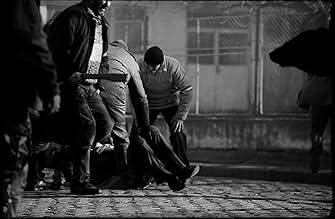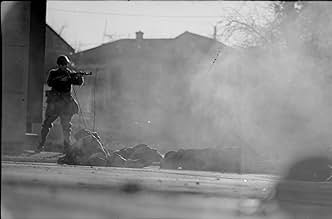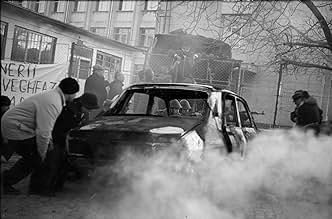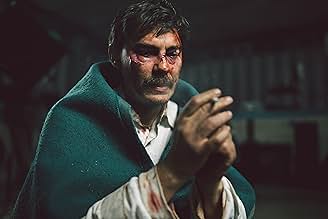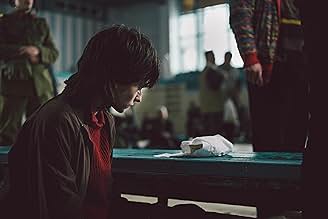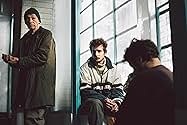Libertate
NOTE IMDb
7,4/10
2 k
MA NOTE
Pendant les jours chaotiques de la révolution de décembre 1989 qui a renversé le régime communiste, la ville de Sibiu, en Transylvanie, a été le théâtre d'une violente attaque contre une uni... Tout lirePendant les jours chaotiques de la révolution de décembre 1989 qui a renversé le régime communiste, la ville de Sibiu, en Transylvanie, a été le théâtre d'une violente attaque contre une unité de police.Pendant les jours chaotiques de la révolution de décembre 1989 qui a renversé le régime communiste, la ville de Sibiu, en Transylvanie, a été le théâtre d'une violente attaque contre une unité de police.
- Réalisation
- Scénario
- Casting principal
- Récompenses
- 17 victoires et 10 nominations au total
Avis à la une
This movie is a technically well-done utter failure.
It exudes the hallmark of bad acting: actors shouting out their lines all the time. It presents the hallmark of a bad scenario: no conclusion, no catharsis.
I was there during that revolution. Everyone was trying to find out what would be next in for our destiny, if we'll end in the EU or the Russians will take over. People were trying to find out if their friends are alive, if they'll still have a job next day. Then came the summary process of the dictator on a Christmas Day (to be later followed by the Miner's revolts etc.). Nothing of this was a topic of the movie. A slapstic, one with a historically accurate scenography.
The marketing machine behind and the official endorsement made for a sold-out theatre. This is yet not on the same level with the new Romanian cinema which made a dent in the European cinema in previous years (4-3-2, Beyond the Hills, Aferim etc.). Not even on the same level with well-executed modern Romanian thrillers like Boss (2023).
It exudes the hallmark of bad acting: actors shouting out their lines all the time. It presents the hallmark of a bad scenario: no conclusion, no catharsis.
I was there during that revolution. Everyone was trying to find out what would be next in for our destiny, if we'll end in the EU or the Russians will take over. People were trying to find out if their friends are alive, if they'll still have a job next day. Then came the summary process of the dictator on a Christmas Day (to be later followed by the Miner's revolts etc.). Nothing of this was a topic of the movie. A slapstic, one with a historically accurate scenography.
The marketing machine behind and the official endorsement made for a sold-out theatre. This is yet not on the same level with the new Romanian cinema which made a dent in the European cinema in previous years (4-3-2, Beyond the Hills, Aferim etc.). Not even on the same level with well-executed modern Romanian thrillers like Boss (2023).
"Freedom" or "Libertate" (2023), directed by Tudor Giurgiu and co-written by Cecilia Stefanescu, Tudor Giurgiu, and Nap Toader, stands out as a remarkable addition to the limited corpus of Romanian cinema that explores the events of December 1989 in Romania. At the age of 29, I experienced these historical moments firsthand while residing in neighboring Yugoslavia, where the "revolution" was broadcast continuously for 24 hours. Consequently, this film was essential for me to view.
The film successfully balanced various elements, including violence, humor, community, and political themes. The events of the 1989 revolution still remain shrouded in mystery, yet Tudor Giurgiu excelled in presenting most of the facts in a tangible manner. The casting was exemplary, and each line delivered was fluid, credible, and appropriate for the historical context. This film effectively transports the audience along the continuum of time and space, but more significantly, it delves into the psyches of the protagonists, raising profound questions about the significance of moral ethics and the ability to maintain one's integrity in a dystopian world rife with corruption.
It is my sincere hope that this film receives the acclaim it rightfully merits, as it stands as a true masterpiece.
The film successfully balanced various elements, including violence, humor, community, and political themes. The events of the 1989 revolution still remain shrouded in mystery, yet Tudor Giurgiu excelled in presenting most of the facts in a tangible manner. The casting was exemplary, and each line delivered was fluid, credible, and appropriate for the historical context. This film effectively transports the audience along the continuum of time and space, but more significantly, it delves into the psyches of the protagonists, raising profound questions about the significance of moral ethics and the ability to maintain one's integrity in a dystopian world rife with corruption.
It is my sincere hope that this film receives the acclaim it rightfully merits, as it stands as a true masterpiece.
10AEA0258i
The movie had the right amount of everything, be it violence, humour, community, or politics. The revolution of '89 has many secrets still, but the director and scenographer Tudor Giurgiu did a tremendous job in order to keep the facts palpable. The casting was perfect and every line was fluid, believable, accurate for the time in question. The metaphors used make it not only an action movie, but a psychological one, shaping every character, with flaws and faults. And still, at the end of it you pity and cry along them and start questioning yourself if you would have done things differently. I can only hope it receives the recognition it deserves, because it is a masterpiece.
(I saw it at a pre-screening. The premier is on the 6th of October)
(I saw it at a pre-screening. The premier is on the 6th of October)
Romanian cinema, like a significant part of the Romanian society, is still obsessed with the events of December 1989, which led to the fall of communism. Romania was the last country among the former allies of the USSR in which this regime change took place and the only one in which the transition was violent. Neither historians nor courts nor ordinary people have yet given a clear verdict on those events: what really happened? Was there a popular uprising, a coup d'état, media stage, or a combination of all these? 'Libertate' ('Freedom'), the film directed by Tudor Giurgiu, focuses on what happened in Sibiu, a city that in 1989 had about 150 thousand inhabitants, located in Transylvania, in the geographical center of Romania. In a style that can be characterized as docu-drama, the film follows the struggles between the forces that until the eve had been allies in the preservation of communist order and legality, and which now find themselves - out of manipulation, out of inexperience, out of fear - engaged in - a violent conflict.
Tudor Giurgiu aimed and largely succeeded to create an immersive experience for the spectators, recreating the atmosphere of chaos in Sibiu on December 22, 1989 and in the ten days that followed. He created a gallery of characters in constant motion, most wearing army, militia or security forces uniforms. After some time, a few main characters emerge: Viorel Stanese - officer in the judicial militia who shows up for work and finds himself defending weapon in hand the institution's headquarters against an unclear enemy, Leahu - a taxi driver but perhaps also a security informant who finds himself with a gun in his hand at the wrong time, the army colonel Dragoman who evolves in days or maybe just hours from revolutionary to torturer. Almost all the characters had been collaborators and perhaps even profiteers of the old regime. The order imposed by the dictatorship collapses, everybody fears and suspects everybody else, some find themselves in the camp of the victors, others are categorized as 'terrorists' and become prisoners in a swimming pool emptied of water, along with some of the victims of the repression. In an anthological scene, protesting the conditions of detention, former militiamen and security officers chant 'Freedom!'. But what Freedom can we talk about after half a century of dictatorship? What does this word actually mean?
Tudor Giurgiu makes copious use, especially in the first part of the film, of the mobile camera, with the cameramen among the characters, in the crowds on the streets or next to the panicked officers in the besieged Militia headquarters. The second half of the film is spent most of the time in the structure of the swimming pool, an excellent visual metaphor of an enprisonment space. As things quiet down, so do the cameras and the cinematic style returns to a classic narrative. The swimming pool gradually empties as the prisoners are released, but the first to leave are those who agree to cooperate. The cast is excellent, the actors live their roles rather than act and the difference between documentary and fiction is almost completely erased. With this film, Tudor Giurgiu returns to the roots of Romanian history of the last 33 years. Without judging the characters and their actions and without taking explicit attitudes, he seems to suggest that the current disorientation of many segments of the Romanian society has its origin in the confusion of those December days. 'Libertate' is an intentionally chaotic film about those days of change that could have happened differently.
Tudor Giurgiu aimed and largely succeeded to create an immersive experience for the spectators, recreating the atmosphere of chaos in Sibiu on December 22, 1989 and in the ten days that followed. He created a gallery of characters in constant motion, most wearing army, militia or security forces uniforms. After some time, a few main characters emerge: Viorel Stanese - officer in the judicial militia who shows up for work and finds himself defending weapon in hand the institution's headquarters against an unclear enemy, Leahu - a taxi driver but perhaps also a security informant who finds himself with a gun in his hand at the wrong time, the army colonel Dragoman who evolves in days or maybe just hours from revolutionary to torturer. Almost all the characters had been collaborators and perhaps even profiteers of the old regime. The order imposed by the dictatorship collapses, everybody fears and suspects everybody else, some find themselves in the camp of the victors, others are categorized as 'terrorists' and become prisoners in a swimming pool emptied of water, along with some of the victims of the repression. In an anthological scene, protesting the conditions of detention, former militiamen and security officers chant 'Freedom!'. But what Freedom can we talk about after half a century of dictatorship? What does this word actually mean?
Tudor Giurgiu makes copious use, especially in the first part of the film, of the mobile camera, with the cameramen among the characters, in the crowds on the streets or next to the panicked officers in the besieged Militia headquarters. The second half of the film is spent most of the time in the structure of the swimming pool, an excellent visual metaphor of an enprisonment space. As things quiet down, so do the cameras and the cinematic style returns to a classic narrative. The swimming pool gradually empties as the prisoners are released, but the first to leave are those who agree to cooperate. The cast is excellent, the actors live their roles rather than act and the difference between documentary and fiction is almost completely erased. With this film, Tudor Giurgiu returns to the roots of Romanian history of the last 33 years. Without judging the characters and their actions and without taking explicit attitudes, he seems to suggest that the current disorientation of many segments of the Romanian society has its origin in the confusion of those December days. 'Libertate' is an intentionally chaotic film about those days of change that could have happened differently.
10Tb59
I have just had the privilege of seeing this tonight, at a pre-screening before the actual launch and I can say I was very happy and relieved to see these stories told so well and yet also not be a documentary, in spite of the mountains of research and effort that went into recreating some of the aspects depicted. Probably the best and most mature non-meta Romanian film.
Please go out and support it by seeing it in cinemas, starting October 6th - it's well worth it and it deserves to be seen if you're even remotely interested in Romanian films, history inspired stories - or, indeed, great movies in general!
Please go out and support it by seeing it in cinemas, starting October 6th - it's well worth it and it deserves to be seen if you're even remotely interested in Romanian films, history inspired stories - or, indeed, great movies in general!
Le saviez-vous
- ConnexionsReferences Rocky (1976)
Meilleurs choix
Connectez-vous pour évaluer et suivre la liste de favoris afin de recevoir des recommandations personnalisées
- How long is Freedom?Alimenté par Alexa
Détails
Box-office
- Montant brut mondial
- 255 790 $US
- Durée
- 1h 49min(109 min)
- Couleur
Contribuer à cette page
Suggérer une modification ou ajouter du contenu manquant


